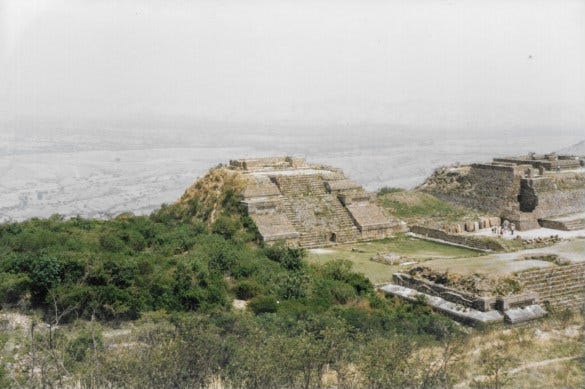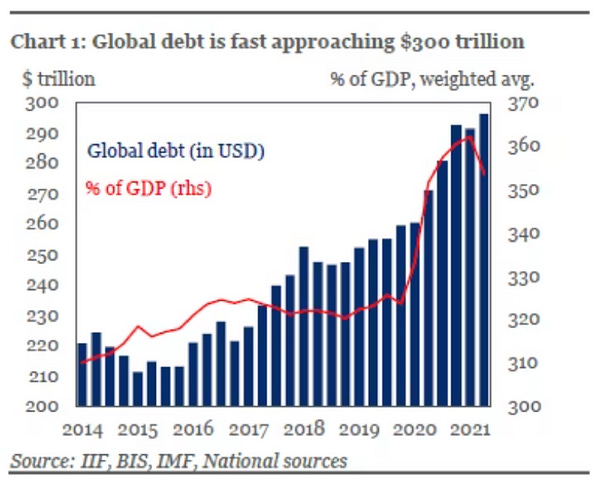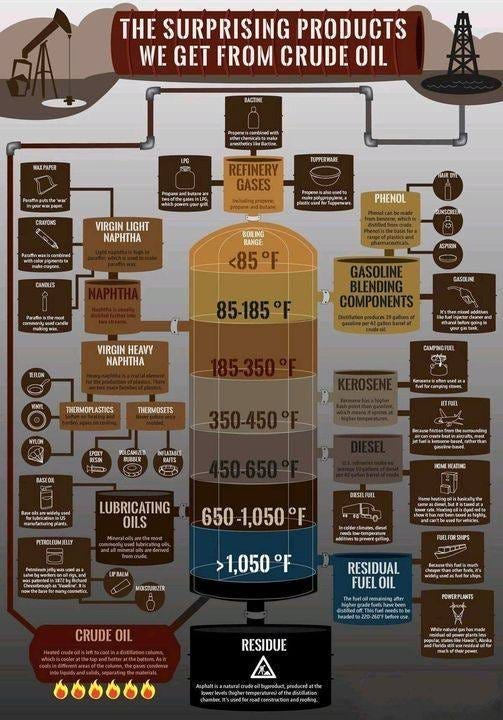Today’s Contemplation: Collapse Cometh CL–Carbon Tunnel Vision and Resource/Energy & Ecological Blindness, Part 2
September 20, 2023 (original posting date)

As I stated at the close of Part 1:
“We have, as a rationalising but not rational story-telling ape, created myths about our place in the universe and how we have contributed to it. Over the past several centuries, and certainly during the most recent one, we story-tellers have weaved narratives that it is our human ingenuity — particularly around technology — that has led to our expansion and apparent ‘successes’ (not the leveraging of a one-time cache of easily-accessible, storable, and transportable dense energy).
Along the way, we have lost sight of our place and dependence upon Nature, and how fundamentally important its complexities are to our very survival. As a result, many continue to cheerlead that which is most dangerous to our and every species existence on this planet; ignoring or rationalising away the signals being sent.”
This story-telling aspect of our species appears to be applicable to every sociocultural institution or school of thought that humans use to help them interpret, understand, and explain the universe and its workings.
As this paper that reviews the evidence surrounding the “…mainstream narrative for achieving socially just ecological sustainability” reminds:
“…humans are storytellers by nature. We socially construct complex sets of facts, beliefs, and values that guide how we operate in the world. Indeed, humans act out of their socially constructed narratives as if they were real. All political ideologies, religious doctrines, economic paradigms, cultural narratives — even scientific theories — are socially constructed ‘stories’ that may or may not accurately reflect any aspect of reality they purport to represent. Once a particular construct has taken hold, its adherents are likely to treat it more seriously than opposing evidence from an alternate conceptual framework.”
Before unpacking the psychology behind this phenomenon, let’s consider the concept of ‘energy blind spots’.
Energy Blind Spots
The term ‘blind spot’ arises from the idea that there exists a “spot within one’s range of vision but where one cannot see”. It’s initial use was physiological in nature but just as the word ‘blind’ had become used to suggest confusion or not controlled by reason, ‘blind spot’ became a reference to other more figurative aspects of life (e.g., morals, intellectual pursuits, general understanding) that one could not see, was confused about, or just simply ignored — the ‘carbon tunnel vision’ I discuss in Part 1 is an example.
In the sense of ‘energy’, it’s the inability to connect the fact that energy is the fundamental underpinning of all life and life processes but also, as Nate Hagens argues (in this video), our tendency to misattribute or ignore the ‘power’ derived from the energy sources we depend upon: “To our ancestors, the benefits from carbon energy would’ve appeared indistinguishable from magic. And instead of appreciating this giant one-time windfall, we developed stories that our newfound wealth and progress had emerged purely from human ingenuity. We had become energy blind.”
Hagens goes on to point out that everything requires energy from animal physiological functioning to human economic systems and everything in between. The ‘benefits’ that energy — particularly the one-time cache of easily-accessible/recoverable, dense, storable, and transportable hydrocarbon fuels — provides to human complex systems is, in human time scales, virtually indistinguishable from magic (see this video).
One barrel of oil, for example, can provide the equivalent of 4–5 years of human labour, but since we have been growing the supply and creating enormous surplus energy we hardly — if at all — take note of the tremendous impact and benefits of this energy source. It has been taken for granted, particularly as it pertains to our expansion of complex socioeconomic systems and technology. And this extremely unique period of our human existence (where we are drawing down a finite resource to ‘power’ our expansion well beyond the natural environmental carrying capacity of our planet) has been normalised within our social zeitgeist. It is the way things have been and will continue to be…to infinity and beyond.

Much gets discounted/ignored/misattributed by most people in their thinking (or, rather, non-thinking) about the hydrocarbon energy that goes into our existence: the millions of years necessary to create it; the complexity of accessing, extracting, refining, and distributing it; the pollution streams that arise from our extraction and use; and, all the energy that is lost in these processes — let alone the significant complexities of the socio-economic and -political aspects (from financial/monetary manipulation to resource wars).
While we appear to have more of this resource each year, we are also growing in both our population and economies resulting in less actual energy available per capita (NB: this metric has plateaued since 2018 when oil production hit its peak) and the very important surplus energy it provides to ‘fuel’ our continuing pursuit of growth (see Dr. Tim Morgan’s website for great insight into this aspect). But rather than consider these aspects of our energy windfall, we instead tend to focus upon our technology and economies (especially in terms of money) believing our current living arrangements have no limit.
In doing so, we fail to consider the drawdown of this finite resource and also the diminishing returns we are encountering as the cheap and easy-to-access reserves have mostly been extracted. To counter this (and other stressors) we have greatly expanded debt and manipulated interest rates. These financial/monetary manipulations have aided our efforts to access perhaps the last of our reserves via tight/shale oil extraction[1].

This has also helped to make it appear that our reserves are boundless — it’s simply our technology and politics holding back endless extraction — ignoring, of course, the significant fall-off in extraction experienced with these shale wells and thus the necessity to increase exponentially the drilling to maintain rates[2]. As Hagens argues, we are simply widening the straw to drawdown more quickly a finite quantity of our most important energy resource.
In addition, these shale oil reserves are drawn from the source rock that feeds other deposits; and once these are used up there are no other places to extract from except perhaps bitumen deposits — an extremely ecologically-destructive and energy-intensive process[3].
Most people’s views of energy production — be it from hydrocarbons or non-renewable, renewable energy-harvesting technology — is rather simplistic; in fact, the vast majority probably don’t even think about it at all as with most complex processes in today’s world and thus the ‘magical’ nature that arises with our technologies.
Hydrocarbon refining is rather complex and energy intensive (with intensity and complexity depending upon the source material) with the various products the result of distillation, cracking, reforming, treating, and blending. Basically, crude oil is heated in a distilling column that vapourises the various chemicals with each condensing at different temperatures as it rises in the distiller. Collection trays then siphon off each product.

As some products are in greater demand than others, ‘cracking’ (so named as it breaks up longer hydrocarbon molecules) is used to convert certain liquids. ‘Reforming’ is the process used to increase product quality and volume for some of these liquids. Natural contaminants (e.g., sulphur, nitrogen, various heavy metals) are removed by binding them with hydrogen (produced by the reforming process) and then used in other industries. Finally, ‘blending’ of various refined liquids is carried out to create the different products that get used to power our vast array of technologies.
Another brick in this energy wall that gets lost for most people is the vast array of products that get produced from hydrocarbons[4]. It’s one thing to argue that non-renewable, renewable energy-harvesting technologies will replace our hydrocarbons, it’s quite another to then look at the products — some of them quite important to our modern complexities, others quite superfluous — and imagine how these will be produced without oil and gas.

There are compelling stories, especially from economic schools of thought, that virtually everything is ‘replaceable’ if there is the demand — ignoring/denying, of course, the biogeophysical limits that exist upon a finite planet (to say little of the Laws of Thermodynamics).
Perhaps among the most important hydrocarbon inputs (and ones that are most people are blind to) include those into our modern, industrial agricultural and transportation systems (especially those involved in our long-distance supply chains). While there exist competing narratives about whether these inputs can be replaced by non-hydrocarbon ones, the scale and economy of such a transition are often glossed over or completely ignored — I find this particularly true for those advocating for the immediate cessation of hydrocarbon energy extraction and use — and with no real plan in place for the consequences of this approach.
The ‘Green’ or ‘Third Agricultural Revolution’, for example, has been made almost entirely possible because of the Haber-Bosch Process. This industrial-scale process for the creation of agricultural fertilisers, herbicides, and pesticides (as well as other non-agricultural products) converts atmospheric nitrogen to ammonia by a reaction with hydrogen that is produced using natural gas as the feedstock but also requiring significant oil and coal inputs.
And while some have argued that the non-renewable hydrocarbon inputs for this undertaking can be replaced by ammonia production via concentrated solar energy (ignoring the same complexities and ecological destructiveness that accompanies the production, distribution, maintenance, and disposal/reclamation of these non-renewable, renewable energy-harvesting technologies), all such bargaining does is attempt to sustain a population well above the natural carrying capacity — a predicament created by our leveraging of hydrocarbons.
As Vaclav Smil highlights in this essay on our population explosion:
“What is the most important invention of the twentieth century? Aeroplanes, nuclear energy, space flight, television and computers will be the most common answers. Yet none of these can match the synthesis of ammonia from its elements…the world’s population could not have grown from 1.6 billion in 1900 to today’s six billion [over eight today] without the Haber–Bosch process.”
Removing the hydrocarbon inputs into our global food supplies would be catastrophic without a well-planned and in-place substitute readily available — and probably one that could not support current population levels, let alone be created in a short period of time. And, because of how the world works, such a withdrawal of these inputs would be felt most horrifically by the disadvantaged members of our species.
Blindness to the importance of hydrocarbon energy to almost all of our complex systems is leading us to offer narratives that most assuredly are making our predicament of ecological overshoot worse. They mostly depend upon tales that highlight human ingenuity, especially with respect to technology, and offer ‘solutions’ to maintain for the most part our status quo systems and complexities.
Perhaps the most mainstream stories are that that rally around alternative energy production and technologies but that continue to depend upon ecologically-destructive industrial processes.
Why do we do this? Why do we construct stories that, depending upon one’s perspective, could be considered suicidal in nature? This I will explore in Part 3.
NB: Note that I did not go into detail about our ‘resource- and ecological-blindness’ but remained focussed upon our energy blindness in this essay. My discussion was already getting longer than originally planned so I decided to leave those aspects since the principles are virtually identical.
In our attempts to simplify our perspective on complexities, we create stories to aid our understanding and then view the world through the lens of our socially-constructed narratives that tend to ignore/deny/rationalise away aspects that don’t fit into our preconceived paradigm/worldview/schema. This is as true for material resources and the ecological impacts of our extractive enterprises as it is for the energy aspect.
[1] See this recent article on US shale oil extraction.
[3] See this, this, this, this, and/or this.
[4] See this, this, this, and/or this.
If you’ve made it to the end of this contemplation and have got something out of my writing, please consider ordering the trilogy of my ‘fictional’ novel series, Olduvai (PDF files; only $9.99 Canadian), via my website or the link below — the ‘profits’ of which help me to keep my internet presence alive and first book available in print (and is available via various online retailers).
Attempting a new payment system as I am contemplating shutting down my site in the future (given the ever-increasing costs to keep it running).
If you are interested in purchasing any of the 3 books individually or the trilogy, please try the link below indicating which book(s) you are purchasing.
Costs (Canadian dollars):
Book 1: $2.99
Book 2: $3.89
Book 3: $3.89
Trilogy: $9.99
Feel free to throw in a ‘tip’ on top of the base cost if you wish; perhaps by paying in U.S. dollars instead of Canadian. Every few cents/dollars helps…
https://paypal.me/olduvaitrilogy?country.x=CA&locale.x=en_US
If you do not hear from me within 48 hours or you are having trouble with the system, please email me: olduvaitrilogy@gmail.com.
You can also find a variety of resources, particularly my summary notes for a handful of texts, especially Catton’s Overshoot and Tainter’s Collapse: see here.
It Bears Repeating: Best Of…Volume 1
A compilation of writers focused on the nexus of limits to growth, energy, and ecological overshoot.
With a Foreword and Afterword by Michael Dowd, authors include: Max Wilbert; Tim Watkins; Mike Stasse; Dr. Bill Rees; Dr. Tim Morgan; Rob Mielcarski; Dr. Simon Michaux; Erik Michaels; Just Collapse’s Tristan Sykes & Dr. Kate Booth; Kevin Hester; Alice Friedemann; David Casey; and, Steve Bull.
The document is not a guided narrative towards a singular or overarching message; except, perhaps, that we are in a predicament of our own making with a far more chaotic future ahead of us than most imagine–and most certainly than what mainstream media/politics would have us believe.
Click here to access the document as a PDF file, free to download.
[…] Blindness, Part 1, September 7, 2023. Website Medium Substack; Part 2. September 20, 2023. Website Medium Substack; Part 3. October 6, […]